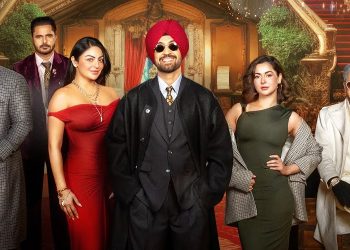Ridley Scott has consistently highlighted the minuscule nature of humanity’s thirst for power, a trait accentuated by the authoritative director’s cigar-chomping approach to running sets like a maverick general with his private army. Even with this knowledge, moviegoers were unprepared for the extent to which his latest film humiliates one of history’s most ambitious rulers.
The decision to collaborate again with Joaquin Phoenix hinted that “Napoleon” would offer a less-than-flattering portrayal of its namesake. Phoenix’s previous roles, particularly as the sniveling boy-emperor in “Gladiator,” showcased his ability to embody the feral menace of male insecurity. Scott’s recent films like “The Martian” and “Prometheus” further emphasized his disdain for those who reach too high. Yet, the comedic tone of the film was unexpected, surpassing even the gleeful performance in “The Last Duel.”

Describing Ridley Scott’s “Napoleon” as rushed may sound odd for a 2-hour-and-38-minute epic, but the ambitious yet muddled film struggles to cover nearly three decades of the ruler’s eventful life adequately. From Napoleon’s ascent to power in his mid-20s to his death in 1821 at age 51, the film attempts to encapsulate a whirlwind of historical events. The narrative explores his brash military leadership, support for anti-royalist ideals, and the Napoleonic Wars, but the film’s focus on grand battle sequences becomes less compelling over time.
While the film meticulously recreates historical events, such as the coronation ceremony depicted in Jacques-Louis David’s painting, the narrative fails to delve into the political intricacies that shaped Napoleon’s reign. The film oscillates between intimate moments with Napoleon and his first wife, Joséphine de Beauharnais, and large-scale battlefield scenes, leaving the audience with either a close-up view of private life or a distant perspective on the brutality of early 19th-century warfare.

Joaquin Phoenix’s portrayal of Napoleon is a captivating mix of contradictory drives, showcasing the ruler’s petulance, selfishness, and impulsiveness alongside his ability to motivate masses through self-mythologizing propaganda. The film incorporates unexpected laugh lines, highlighting the director’s intent to puncture Napoleon’s fragile ego. However, the lack of engagement with the political implications of Napoleon’s achievements and failures remains a significant flaw.
Also read: Dolly Parton dazzles crowd during Cowboys halftime show
The film’s failure to explore debates surrounding Napoleon’s character—whether he was a revolutionary reformer or a merciless autocrat—leaves a storytelling opportunity unexplored. Major figures like Talleyrand and the Duke of Wellington appear briefly, without providing insight into their perspectives on Napoleon’s rise to power. The film’s truncated story arcs and underdeveloped characters might be addressed in the director’s cut, but as it stands, “Napoleon” feels more like a highlight reel than a comprehensive historical epic.
In the absence of a deeper exploration of Napoleon’s political significance, the film falls short of connecting his era to the present day. Despite Ridley Scott’s past success in drawing parallels between historical periods, “Napoleon” misses the mark, failing to illuminate how the ruler’s influence persists in our modern age. While Scott and Phoenix’s collaboration on “Gladiator” was a triumph, “Napoleon” leaves audiences yearning for a more insightful and entertaining experience.


































